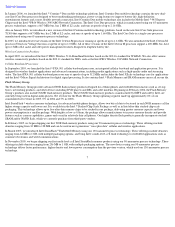Intel 2005 Annual Report Download - page 21
Download and view the complete annual report
Please find page 21 of the 2005 Intel annual report below. You can navigate through the pages in the report by either clicking on the pages listed below, or by using the keyword search tool below to find specific information within the annual report.
Table of Contents
Corporate Governance
Corporate governance is typically defined as the system that allocates duties and authority among a company’s stockholders, board of directors and
management. The stockholders elect the board and vote on extraordinary matters; the board is the company’s governing body, responsible for hiring,
overseeing and evaluating management, particularly the Chief Executive Officer (CEO); and management runs the company’s day-to -day operations.
The Board believes that there should be a substantial majority of independent directors on the Board. The Board also believes that it is useful and
appropriate to have members of management, including the CEO, as directors.
The current Board members include nine independent directors and two members of Intel’s senior management. The Board members are Craig R.
Barrett, Intel’s Chairman of the Board; Ambassador Charlene Barshefsky, Senior International Partner at the Wilmer Cutler Pickering Hale and Dorr
LLP law firm; E. John P. Browne, Group Chief Executive of BP plc; D. James Guzy, Chairman of Arbor Company; Reed E. Hundt, Principal, Charles
Ross Partners, LLC; Paul S. Otellini, Intel’s Chief Executive Officer and President; James D. Plummer, John M. Fluke Professor of Electrical
Engineering, Frederick E. Terman Dean of the School of Engineering, Stanford University; David S. Pottruck, Chairman and Chief Executive Officer
of Red Eagle Ventures, Inc. and Chairman of Eos Airlines; Jane E. Shaw, retired Chairman and Chief Executive Officer of Aerogen, Inc.; John L.
Thornton, Professor and Director of Global Leadership at Tsinghua University, Beijing, China; and David B. Yoffie, Max and Doris Starr Professor of
International Business Administration, Harvard Business School. The Board also has one Director Emeritus, Gordon E. Moore, who may participate in
Board meetings but does not vote.
Director Changes in 2005.
At the 2005 annual meeting, Andrew S. Grove retired from the Board. Craig R. Barrett succeeded Dr. Grove as Chairman
of the Board, and Paul S. Otellini succeeded Dr. Barrett as Chief Executive Officer. In July 2005, the Board elected James D. Plummer to the Board.
Adoption of Majority Vote Standard for Election of Directors.
On January 18, 2006, the Board approved an amendment to Article III, Section 1 of
Intel’s Bylaws to require directors to be elected by a majority of the votes cast with respect to such director in uncontested elections (number of shares
voted “for” a director must exceed the number of votes cast against that director). In a contested election (a situation in which the number of nominees
exceeds the number of directors to be elected), the standard for election of directors will be a plurality of the shares represented in person or by proxy
at any such meeting and entitled to vote on the election of directors. If a nominee who is serving as a director is not elected at the annual meeting,
under Delaware law the director would continue to serve on the Board as a “holdover director.” However, under our Bylaws, any director who fails to
be elected must offer to tender his or her resignation to the Board. The Corporate Governance and Nominating Committee would then make a
recommendation to the Board whether to accept or reject the resignation, or whether other action should be taken. The Board will act on the Corporate
Governance and Nominating Committee’s recommendation and publicly disclose its decision and the rationale behind it within 90 days from the date
the election results are certified. The director who tenders his or her resignation will not participate in the Board’s decision. If a nominee who was not
already serving as a director is not elected at the annual meeting, under Delaware law that nominee would not become a director and would not
continue to serve on the Board as a “holdover director.” In 2006, all nominees for the election of directors are currently serving on the Board.
For more information on our corporate governance, please see the sections of our proxy statement for our 2006 Annual Stockholders’ Meeting under
the headings “The Board, Board Committees and Meetings” and “Corporate Governance Guidelines,” which are incorporated herein by reference.
17
























